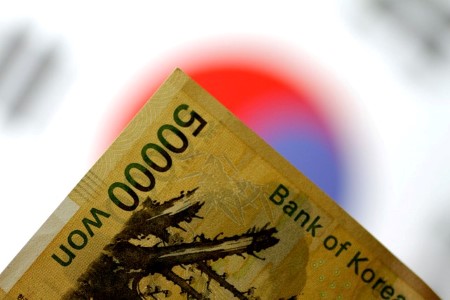South Korean won, Taiwan dollar recover
Chinese yuan flat, stocks down on weak economic sentiment
Asian equities mixed
By Archishma Iyer
Jan 18 (Reuters) –Most Asian currencies were muted on Thursday, while equities struggled to make headway, as markets digested a dim economic outlook from the region’s largest economy coupled with a scaling back of bets on rate cuts by the U.S. central bank.
The MSCI emerging markets currencies index .MIEM00000CUS was marginally up, even as it was hovering near a month’s low.
At 0330 GMT, the dollar index .DXY, which measures the greenback against six major rivals, was perched at 103.29.
Investors remained cautious about China as weak economic data from Asia’s largest trading partner showed the persistent pressure of a protracted property crisis and subdued demand.
The yuan CNY=CFXS was flat, while Chinese stocks .SSEC fell as much as 2.4% to hit almost a three-year low.
In the U.S., stronger retail sales data showed that the Federal Reserve may not quickly move to slash interest rates, with the CME FedWatch tool now showing a 53.8% chance of a rate cut in March, down from 63.1% previously.
In Asia, the South Korean won KRW=KFTC and the Taiwan dollar TWD=TP were the lead gainers for the day, rising as much as 0.2% each, even as the former lingered near its November lows.
“Asian currencies, mainly the Korean won and Taiwan dollar have seen quite a tear of late, given the less favourable mix of sell-off in equities, higher yields, China growth concerns and geopolitical risks,” said Christopher Wong, a currency strategist at OCBC.
Citi analysts estimated there was a combined $5.2 billion of net capital outflows in Asia due to a dollar short squeeze, particularly from Taiwan, South Korea and China, the largest since China’s COVID-19 lockdowns and the Russia-Ukraine conflict’s escalation in March 2022.
Wong, however, sees a return of portfolio inflows into Asia because central bank pivots are still expected this year.
“Eventually a less restrictive rate environment coupled with exports recovery in the region with a turnaround in tech down-cycle should still support a return of flows to the region,” he said.
Other Asian currencies such as the Philippines’ peso PHP= eked out marginal gains, while the Indonesian rupiah IDR= and the Singapore dollar SGD= were flat.
Bank Indonesia kept policy rates steady on Wednesday to stabilise the rupiah and keep inflation within target, but said it would be patient over its next moves, with room to cut rates dependent on the currency.
Among Asian equities, those in Bangkok .SETI, Manila .PSI and Kuala Lumpur .KLSE were down between 0.2% and 1%, while those in Singapore .STI and Jakarta .JKSE rose 0.2% and 0.7% respectively.
HIGHLIGHTS:
** Indonesia’s benchmark 10-year bond yield rises to 6.718%
** TSMC expected to show a fall in quarterly revenue for period ended Dec 31
** Vietnam tightens limits on investors’ stakes in banks
|
Asia stock indexes and currencies at 0330 GMT |
||||||
|
COUNTRY |
FX RIC |
FX DAILY % |
FX YTD % |
INDEX |
STOCKS DAILY % |
STOCKS YTD % |
|
Japan |
JPY= |
+0.06 |
-4.73 |
.N225 |
0.45 |
6.49 |
|
China |
CNY=CFXS |
+0.01 |
-1.36 |
.SSEC |
-2.56 |
-7.19 |
|
India |
INR=IN |
+0.00 |
+0.08 |
.NSEI |
0.00 |
-0.73 |
|
Indonesia |
IDR= |
+0.01 |
-1.52 |
.JKSE |
0.81 |
-0.19 |
|
Malaysia |
MYR= |
+0.02 |
-2.63 |
.KLSE |
-0.63 |
1.87 |
|
Philippines |
PHP= |
+0.13 |
-0.79 |
.PSI |
-0.92 |
0.96 |
|
S.Korea |
KRW=KFTC |
+0.12 |
-4.07 |
.KS11 |
0.43 |
-7.87 |
|
Singapore |
SGD= |
+0.09 |
-1.80 |
.STI |
0.16 |
-2.87 |
|
Taiwan |
TWD=TP |
+0.07 |
-2.64 |
.TWII |
0.26 |
-4.04 |
|
Thailand |
THB=TH |
-0.08 |
-3.98 |
.SETI |
0.25 |
-2.25 |
Reporting by Archishma Iyer in Bengaluru; Editing by Jamie Freed
















